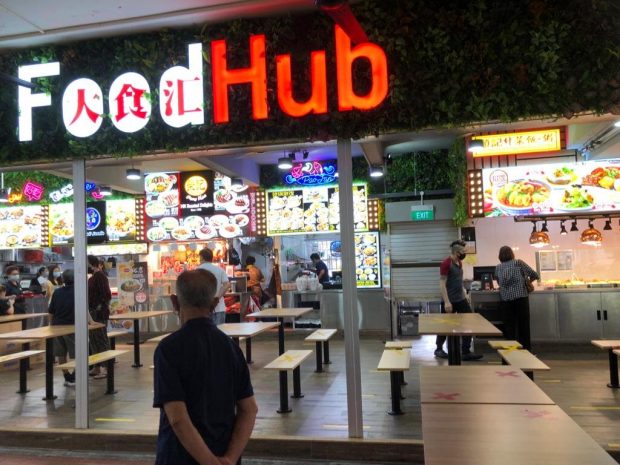Cautious easing of tightened Covid-19 curbs in Singapore

Caterers disappointed: Tables set but dining-in will be allowed only from June 21
By Ivan Lim Former
AJA President, Contributor to AsiaN
SINGAPORE: Singapore is moving cautiously to ease some heightened restrictions following a drop in community cases in the past week.
From June 14, five people, instead of two, can gather publicly. However, they will not be allowed to sit down in a coffee shop or restaurant to have meals. They will only be able to do so a week later on June 21.
During this first stage of re-opening, five people at a time can visit households, limited to twice daily.
A tangible sign of the dialling down of curbs is the re-opening of the showpiece Jewel shopping cum-entertainment complex at Changi Airport.The staggered re-opening, while disappointing to some, especially food vendors, has generally been welcomed.
A rampant rise in infections caused by the highly contagious Delta variant of the Covid-19 virus originating in India compelled the authorities to impose tougher curbs from May 14 to June 13.
“We may continue tosee a few cases everyday but that is the nature of the virus,” said Mr Gan Kim Yong, Minister of Trade and Industry and co-chair of the task force handling the pandemic.
On June 13, the taskforce reported ten community cases and three imported ones. This was a big dip from 24 cases on the eve of the clampdown. Then the sizeable Covid-19 clusters at Tan Tock Seng Hospital and Changi Airport, the ground zero of imported infections, had raised the fear of a potential tipping point in mass outbreaks. A heightened alert was accordingly declared.
With the two-step easing, the limit on the number of people attending wedding solemnisations and religious worship services has been upsized too, complete with mandatory pre-event testing.
In transiting into life under the endemic Covid-19, the government is now relying on the time-tested method of extensive contact-tracing, testing, and vaccinations.The new mode of virus control will be localised curbs in place of wholesale lockdowns.
Experts say that an endemic situation means the virus will be circulating around but infections will be milder than in a pandemic, particularly where people have been vaccinated.
In a nation-wide address on May 31 focused on the “new normal”, Prime Minister Lee Hsien Loong told Singaporeans the coronavirus will remain endemic for a long time to come. As such, they would have to live with the virus in their midst but take steps to tame it.
Under the new normal, regular Covid-19 tests will be conducted for workers such as those at the Changi Airport. Aside from routineswab tests, the airport staff have to put on personal protection equipment wear surgical masks, face shields and gloves.
As part of the transition to the new norm, the authorities have stepped up its vaccination programme aimed at achieving a state of herd immunity at year’s end. Vaccinations for students from schools, colleges and tertiary institutions are in full swing and have begun for children and young adults. Vaccinations led off with the elderly as well health care and frontline personnel.
As of Wednesday, more than 2.5 million people — about 44 per cent of Singapore’s population of 5.7 million—had received one dose of the vaccinations
The Ministry of Health also stated that working from home will remain the order of the day throughout the gradual re-opening. This is to reduce the face-to-face meetings and fewer people taking public transport that might cut down any potential chain of virus transmission
Ahead of the gradual re-opening, the government is seeking to launch a travel bubble with Hong Kong that had been held up twice by spikes in virus outbreaks.
Singapore has also initiated talks with Australia and South Korea on safe travel arrangements.























































